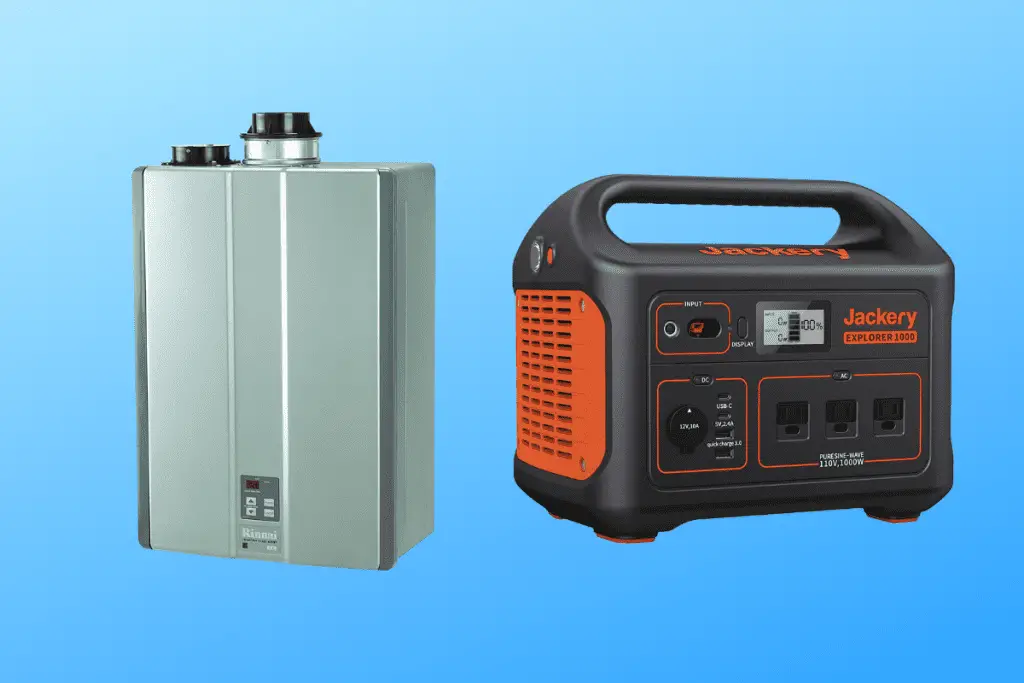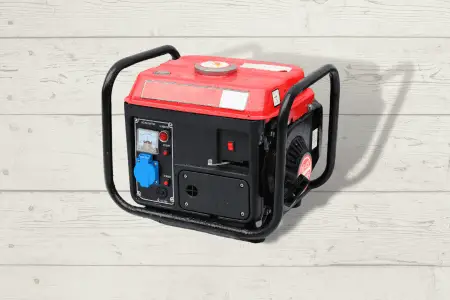You can run a water heater on a generator, but the available continuous output wattage of the generator must be more than the continuous wattage demand of the water heater. The average residential water heater requires about 4 kilowatts of continuous power to provide on demand hot water. Therefore, any generator must be capable of providing at least that much wattage continuously.
What Size Generator Do I Need to Run a Hot Water Heater?

We have already determined that the generator’s output wattage must be greater than the demand of the water heater, but what does that mean?
Every appliance sold in the U.S. must be U.L. approved, which just means the manufacturers must follow a certain set of rules so that all appliances will work. Those rules include listing the important specifications of the appliance on the label.
In the case of water heaters, the label is usually bright yellow and will list all sorts of information about the appliance. The information on this label will describe the energy efficiency of the water heater, how much wattage it needs to perform as designed, and how much water it can hold.
Generators will provide similar information on its label, but the most important specification will be the output of the generator. Most portable, gasoline powered generators can produce anywhere from 2 kilowatts to 5 kilowatts. Since the average residential water heater only demands about 4 kilowatts, in theory the water heater can be powered by the power generator.
However, this is not done by simply plugging a water heater into the wall, because water heaters are considered a permanent appliance and are connected directly to the home’s electrical service.
Problems with connecting water heater to generator
One common problem that arises when consumers attempt to connect a water heater to their portable generator is that many hot water heaters require a 220-volt power source, yet portable generators often do not have a 220-volt output. Although some of these portable generators have a 220v outlet, a regular water heater will have no power cord to plug into the generator.
The exceptions are, portable water heaters specifically designed to work with portable generators. These portable water heaters are typically used in camping activities and are not practical for general home use.
- Switch between gasoline (4750 surge watts, 3800 running watt) and propane...
- Voltage easily goes from 120V to 240V, perfect for transfer switches and...
- Electric start powers the 224cc 4-stroke OHV engine with the turn of a key
- 4-gallon tank provides up to 11 hours of half load run time
- Includes two 120V GFCI outlets (5-20R), a 120V/240V NEMA 30A twist lock...
Water heaters are designed to be “hard wired”, which means they do not have the typical plug found on other electric appliances. Water heaters are wired directly to the home’s power source via the house wiring and cannot simply be unplugged.
Therefore, in most situations, the only practical way to run a water heater from a generator is via a natural gas or LP powered generator.
What Size Generator Do I Need to Run a Well and Electric Water Heater?
The generator must be capable of providing not only continuous power, but start up power as well. The available output of the generator should exceed the total start up requirements of both the pump and water heater.
For example, a typical submersible pump startup wattage demand will usually be about double the continuous demand. So, if the pump requires 1 kilowatt to run continuously, the same pump will draw about 2 kilowatts the instant it comes on, before settling down to 1 kilowatt.
In this situation, you must account for not only the power demands of the water heater, but the electric well pump as well. Most well pumps are submersible, which is to say the pump itself is actually far below ground, submersed in the well. This is in contrast to decades past, where well water was pumped to the surface via a surface pump. A submersible pump is usually controlled by a float or pressure switch, which is what provides on demand water.
To determine how much power we need from a generator, we would again locate the label on the appliance. In this case, the submersible pump would have the same label as the generator.
For example, let’s say the submersible pump requires 1.2 kilowatts of continuous power, and we’re using the same water heater as before, which required about 4 kilowatts. Considering that it is very likely that both the water heater and pump will be working simultaneously, this means the total power draw of both the water heater and the pump is approximately 5.2 kilowatts.
If we were using the same generator as the previous example, we can see that the power requirements of the pump and water heater now exceed the maximum continuous power output of the generator.
How Many Watts Does it Take to Run a Hot Water Heater?
This will depend entirely on the type of water heater you are using. If you are using a gas tankless water heater, your electrical output is quite low (100 watts or less) since the water is heated “on demand” by gas. However, a whole house electric tankless water heater can easily consume 4000 or 5000 watts while in use.
The size of the water heater and the ground temperature of the water also directly impacts how much wattage is required to function properly. For example, a 6 GPM electric water heater in the Northeast will have a totally different energy output than a 3 GPM electric water heater used in the South.
Can a 240V water heater run on 120V?
Generally speaking, a 220v water heater cannot run on a 110v circuit. A 220v connection can be described as two 110v connections, wired together. These two circuits are wired in “parallel”, which means if one circuit is disconnected, the other will still work.
Therefore, a single 110v circuit cannot power a 220v water heater, because the water heater would be demanding more from the circuit than the circuit could provide. This would instantly trip the circuit breaker (the switches that turn a circuit on and off), breaking the circuit.
Can I Plug My Hot Water Heater into My Generator?
Plugging your hot water heater to your generator will depend on the hot water heater and the generator being designed to work together.
An example might be a whole house, natural gas or liquid propane generator. These generators are usually connected directly to the home’s gas supply, and contain a switch that detaches the entire home’s electrical system from electrical power to gas power. These switches are often automatic, so if the electricity to the home is interrupted, the generator switches on.
This doesn’t mean your appliances suddenly run on natural gas. It simply means gas is burned to generate an electrical current, providing the home with power. Another example of this would be in a hospital, where power must be available at all times.
These gas-powered generators are often quite large, but as opposed to gasoline powered portable generators, operate quite efficiently. These generators typically have few, if any, moving parts so they are very quiet and powerful. Many of these generators can produce anywhere from 20 kilowatts to 50 kilowatts, depending on the size of the home. Therefore, these generators can replace most of the power lost in the case of a total power outage.

Nick Lopresti is the founder of YourH2Home and a home improvement expert. He has years of experience writing about various home improvement topics, mostly as it pertains to water systems.

